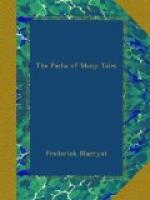The pacha, although much amused, was also a little tired. “Be it so, good Menouni, but recollect, Mustapha, that the caravan must not depart until I hear the end of this story.”
“Be chesm, on my eyes be it,” replied Mustapha; and they all retired for the night.
“What is the cause?” demanded the pacha, hastily, as next day Mustapha listened with apparent patience to the long details of one of the petitioners for justice.
“It is, O lord of wisdom, a dispute between these men, as to a sum of money, which they received as guides to a Frank, who journeyed into the interior. The one was hired for the journey, but not being well acquainted with the road, called in the assistance of the other; they now dispute about the division of the money, which lies at my feet in this bag.”
“It appears that the one who was hired did not know the way.”
“Even so,” replied Mustapha.
“Then he was no guide, and doth not deserve the money. And the other, it appears, was called in to assist?”
“Thy words are the words of wisdom,” replied Mustapha.
“Then was he not a guide, but only an assistant; neither can he be entitled to the money, as guide. By the beard of the Prophet, justice must not be fooled thus, and the divan, held in our presence, be made foolish by such complaints. Let the money be distributed among the poor, and let them each have fifty bastinadoes on the soles of the feet. I have said it.”
“Wallah Thaib—it is well said,” replied Mustapha, as the two disputants were removed from the presence.
“Now call Menouni,” said the pacha, “for I am anxious to hear the story of Yussuf, and the future proceedings of the caliph; and a part of this bag of money will reward him for the honey which falls from his lips.”
Menouni made his appearance, and his obeisance; the pacha and Mustapha received their pipes from the Greek slave, and the Kessehgou then proceeded with his story.
* * * * *
The great caliph, Haroun Alraschid, had as usual held his afternoon audience; the court was dismissed. Haroun, whose whole thoughts were upon the bankrupt condition of Yussuf, and who was anxious to know how he had got on after the fetva had been promulgated, sent for his vizier, Giaffar. “I wish to ascertain,” said the caliph to the vizier, “if the unlucky Yussuf has managed to provide for his bacchanalian revels to-night?”
“There can be no doubt, O vice-regent of the Prophet,” replied Giaffar, “that the young man is seated in the dark, in a most dismal mood, without either wine or kabob, or aught to comfort him.”
“Send for Mesrour, then; we will again resume our disguises, and pay him a visit.”
“Let the humblest of your slaves,” interposed Giaffar, in a great fright, “represent at the footstool of your highness a true picture of what we may anticipate. Doubtless this lion-slayer of Shitan, being famished, will not forget our prophecy, and ascribing its fulfilment to our bad omens, will, in his mood, sacrifice us to his empty stomach.




